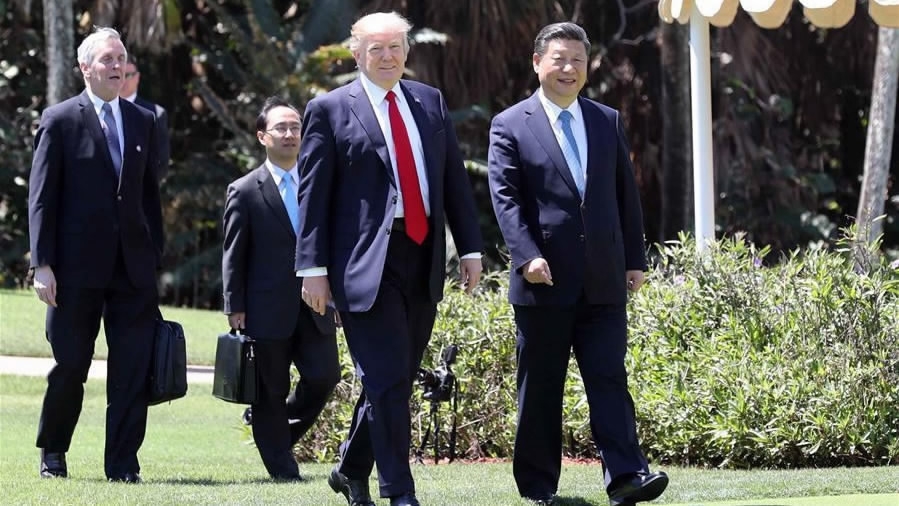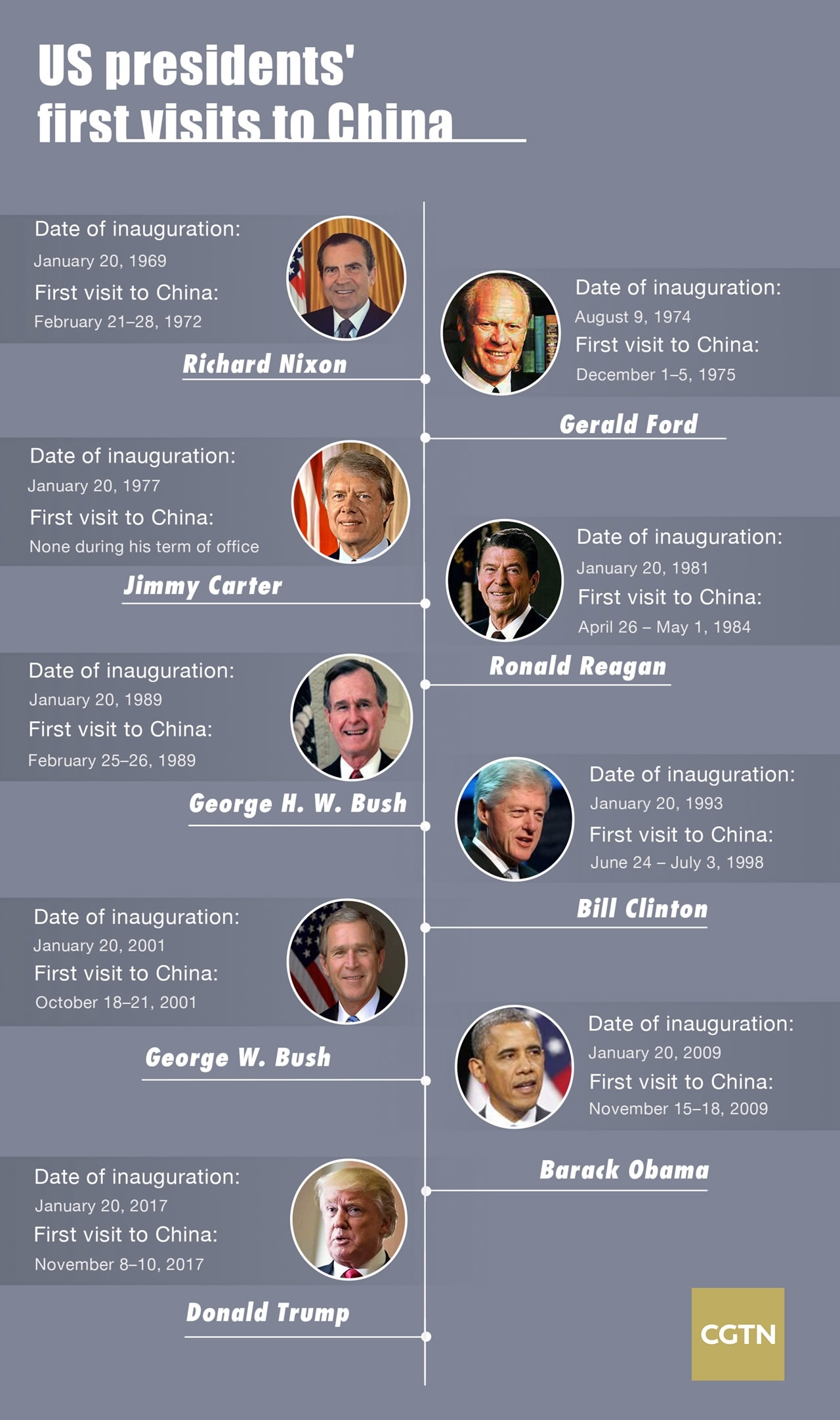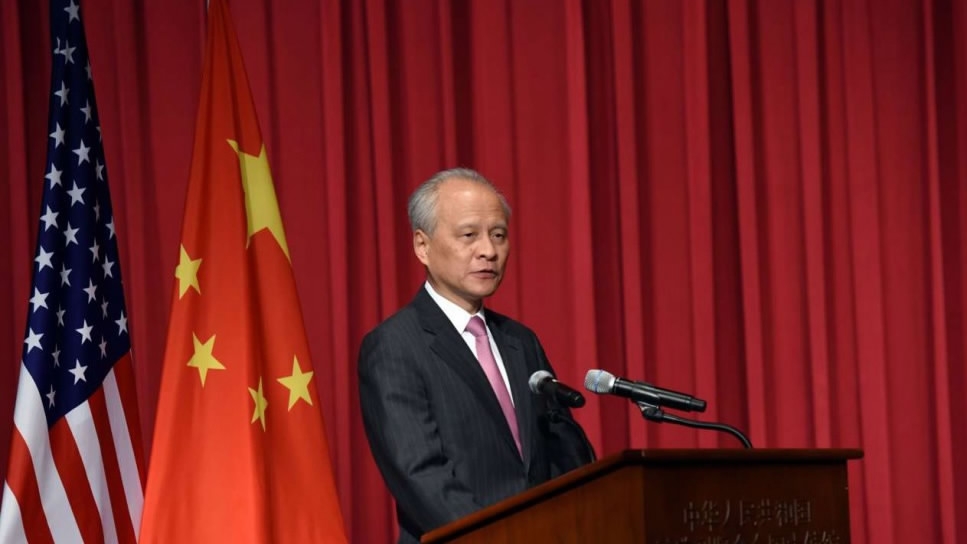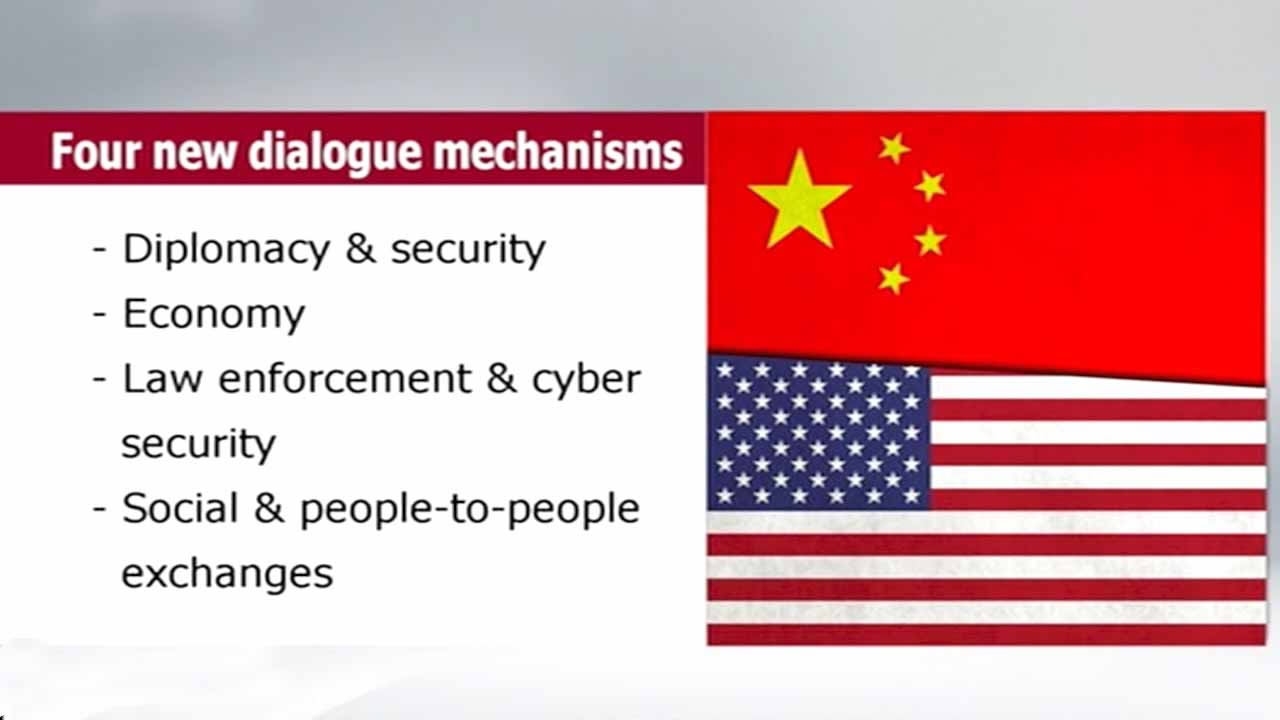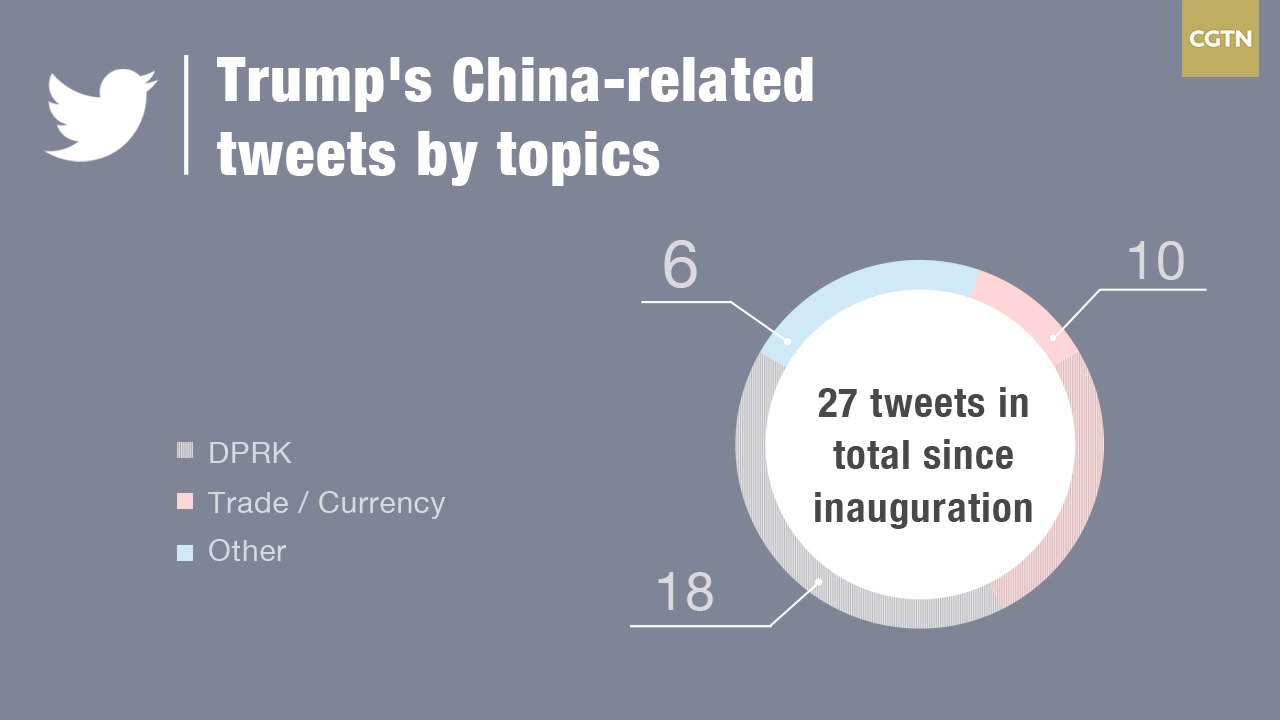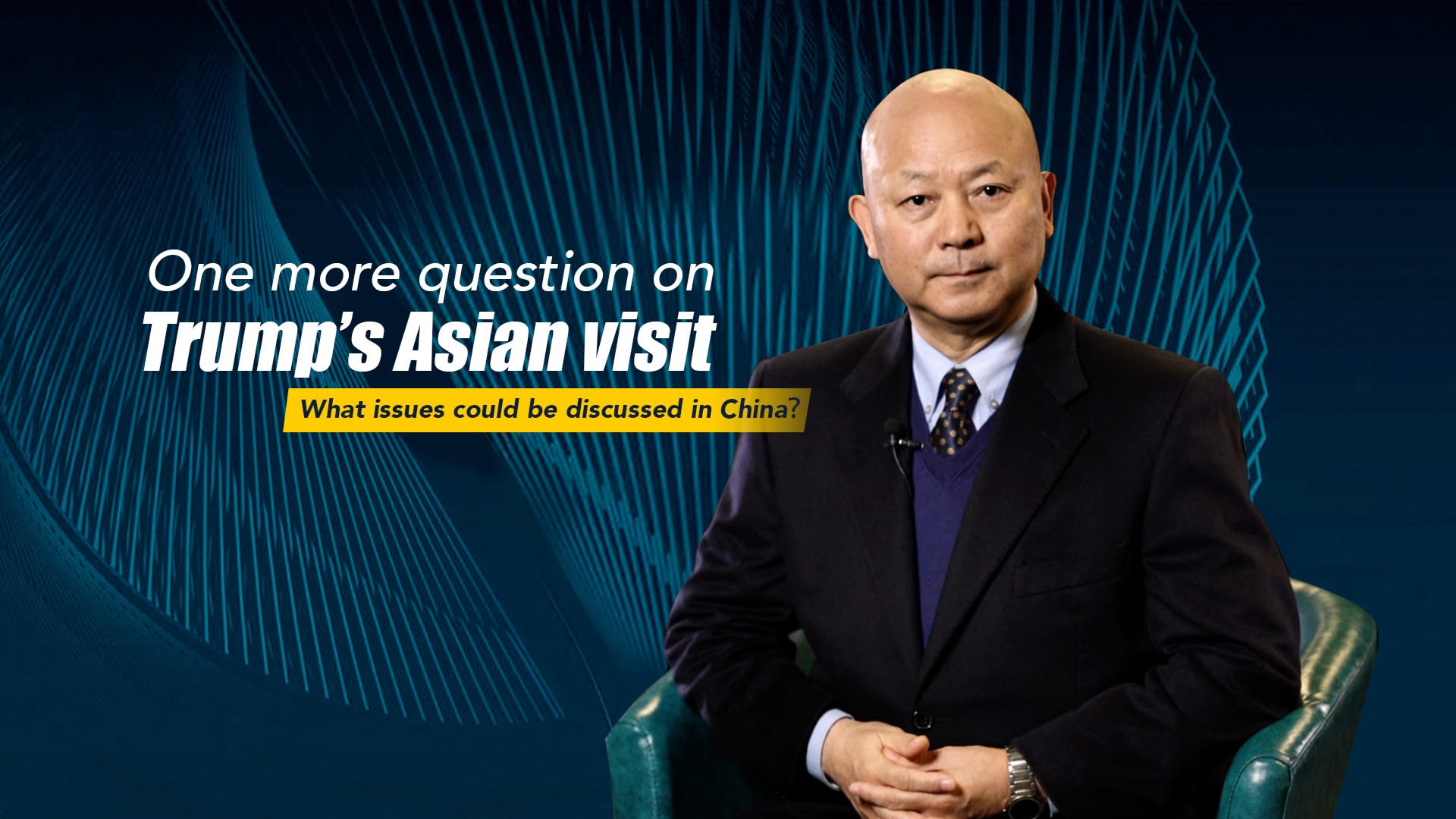As part of his
five-nation Asia tour, US President Donald Trump is scheduled to visit China from Wednesday to Friday, during which he will hold his third face-to-face meeting with Chinese President Xi Jinping.
Beijing has promised a "state visit-plus" experience for the American president featuring a military honor guard, official talks, formal banquet and "special arrangements," according to Chinese Ambassador to the US Cui Tiankai, who recently called the visit a "historic opportunity" to boost cooperation between the world's two largest economies.
"Melania and I look forward to being with President Xi & Madame Peng Liyuan in China in two weeks for what will hopefully be a historic trip!" Trump tweeted in late October.
Both sides expect the visit to be "historic." Indeed, the fact that the two countries' heads of state conduct mutual visits within the first year of a US president's tenure is unprecedented in itself. Despite continued differences on how to denuclearize the Korean Peninsula and trade with each other, China and the United States have clearly got closer and strengthened mutual trust compared with the time when Trump came to power in January.
From his campaign period to his initial days in the White House, Trump repeatedly blasted China's trade policies, vowed to label China as a currency manipulator and even answered a phone call from Taiwan leader Tsai Ing-wen, threatening to reconsider the one-China policy. Many in China worried that the two countries would face a tough time in their relations.
The early tension
began to thaw after Xi and Trump spoke directly over the phone in February. Since then, the two leaders have maintained frequent communication on issues concerning bilateral ties and international situation,
expanding common ground and properly managing differences. The world's most important bilateral ties have grown more rational and mature.
'Outstanding' relationship
Xi and Trump have had two meetings and eight phone calls during the latter's nine-month presidency so far. Following an ice-breaking letter from Trump on February 8, in which he expressed the wish to develop a constructive relationship with China, Xi and his US counterpart had their first phone conversation two days later.
Xi stressed that the one-China policy is the political basis of China-US relations and Trump reiterated his administration's adherence to the principle.
Ties between the two countries and their leaders were enhanced further during Xi's visit to the US on April 6-7. The first Xi-Trump summit, which took place at the Mar-a-Lago resort in Florida, was described as
"positive and fruitful" by Chinese Foreign Minister Wang Yi.
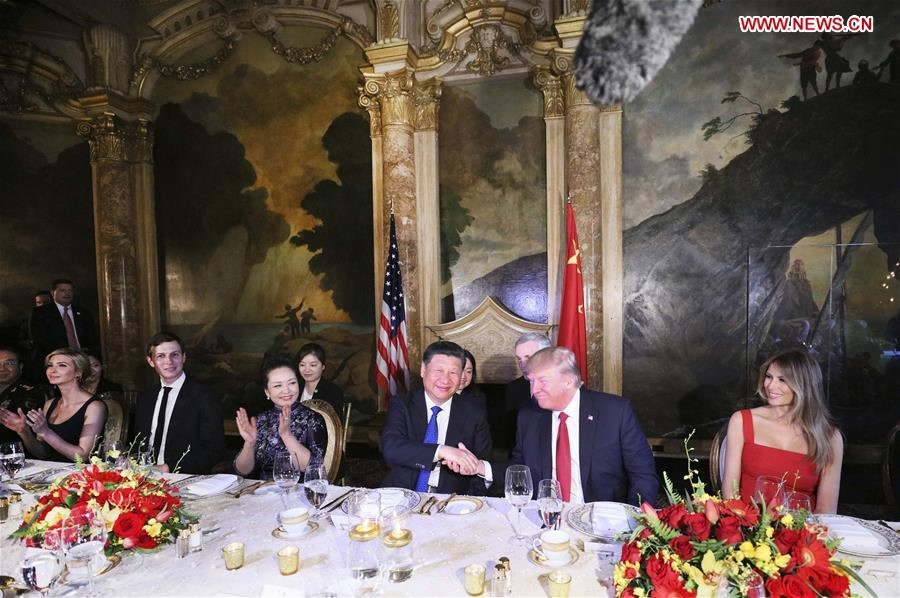
Chinese President Xi Jinping (R3) and his wife Peng Liyuan attend a welcome banquet hosted by US President Donald Trump (R2) and First Lady Melania Trump in the Mar-a-Lago resort in Florida, US, April 6, 2017. /Xinhua Photo
Chinese President Xi Jinping (R3) and his wife Peng Liyuan attend a welcome banquet hosted by US President Donald Trump (R2) and First Lady Melania Trump in the Mar-a-Lago resort in Florida, US, April 6, 2017. /Xinhua Photo
Trump said he developed an "outstanding" relationship with Xi and the two countries made "tremendous progress" in bilateral ties.
The two sides announced the establishment of four high-level mechanisms for dialogue and cooperation on diplomacy and security, the economy, law enforcement and cyber security, as well as social and people-to-people exchanges.
Xi and Trump exchanged views on the Korean Peninsula, and the Chinese president called on the two countries to properly address differences and sensitive issues. Trump also accepted an invitation from Xi to visit China.
The leaders
met again on July 8 at the G20 Summit in Hamburg, Germany and had an in-depth exchange of views regarding the Democratic People's Republic of Korea (DPRK) nuclear issue.
In addition to the in-person meetings, they spoke by phone on April 12, April 24, July 3, August 12, September 6, September 18 and October 25 respectively. As tensions on the Korean Peninsula rose, many of the later calls featured communication and coordination about the DPRK crisis. The two leaders also discussed enhancing bilateral relations and details of Trump's planned visit to China.
In their eighth and latest call, Trump congratulated Xi on being re-elected general secretary of the Central Committee of the Communist Party of China (CPC).
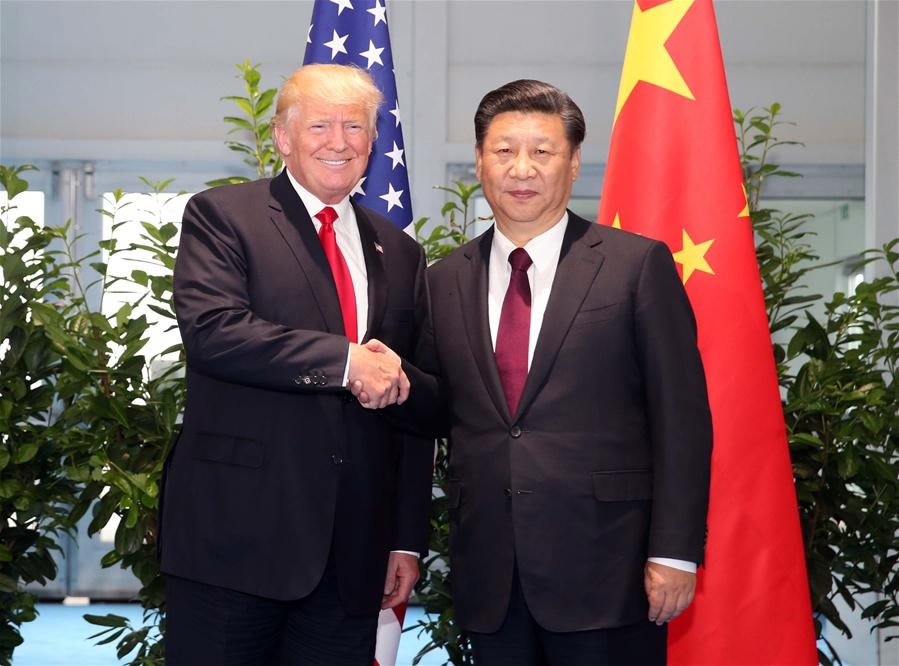
Chinese President Xi Jinping (R) meets with his US counterpart Donald Trump on the sidelines of a Group of 20 (G20) Summit in Hamburg, Germany, July 8, 2017. /Xinhua Photo
Chinese President Xi Jinping (R) meets with his US counterpart Donald Trump on the sidelines of a Group of 20 (G20) Summit in Hamburg, Germany, July 8, 2017. /Xinhua Photo
DPRK and trade
Meanwhile, the US president has sent 27 tweets referencing China, in which the DPRK and trade featured most frequently. He mentioned the DPRK in 18 tweets and US trade or currency policies toward China in 10 tweets. Seven of his tweets referred to both the DPRK and trade.
"Spoke to President Xi of China to congratulate him on his extraordinary elevation. Also discussed NoKo (the DPRK) & trade, two very important subjects!" Trump tweeted on October 25.
He sometimes tried to use the DPRK issue as a bargaining chip in trade talks with China. For example, he accused China of not doing enough to help the US with the DPRK crisis in a pair of tweets on July 29, while also threatening to take a tougher stance on trade.
China has repeatedly stressed that while it is committed to the denuclearization of the Korean Peninsula, it does not hold the key to solving the issue.
Only six of Trump's China-related tweets mentioned neither the DPRK nor trade issues. For example, he tweeted on April 8 after Xi's visit: "It was a great honor to have President Xi Jinping and Madame Peng Liyuan of China as our guests in the United States. Tremendous..."
But it was Twitter's character limit that prevented Trump from raising the thorny issues. The tweet was closely followed by another one, making his words complete: "...goodwill and friendship was formed, but only time will tell on trade."
The two topics are also expected to top Trump's agenda during his tour in China. According to the White House, Trump's first diplomatic trip to Asia is aimed at strengthening international resolve to denuclearize the DPRK, promoting a free and open Indo-Pacific region, and advancing American prosperity through fair and reciprocal trade.
Meeting each other halfway
As a result of joint efforts by both sides, China and the US have made some headway on the two most challenging fronts – the DPRK and trade.
While both countries are committed to the ultimate goal of denuclearization on the Korean Peninsula, they disagree on the best way to move forward. Beijing stresses that dialogue and negotiation are the only way out for the DPRK nuclear issue, urging a peaceful solution, while Washington puts more emphasis on sanctions and pressure, threatening Pyongyang with "military solutions."
Despite the differences, there are encouraging signs that Beijing and Washington are trying to meet each other halfway. China supported the United Nations Security Council's efforts to step up sanctions against the DPRK in August and September, while senior US officials left the door open for talks.
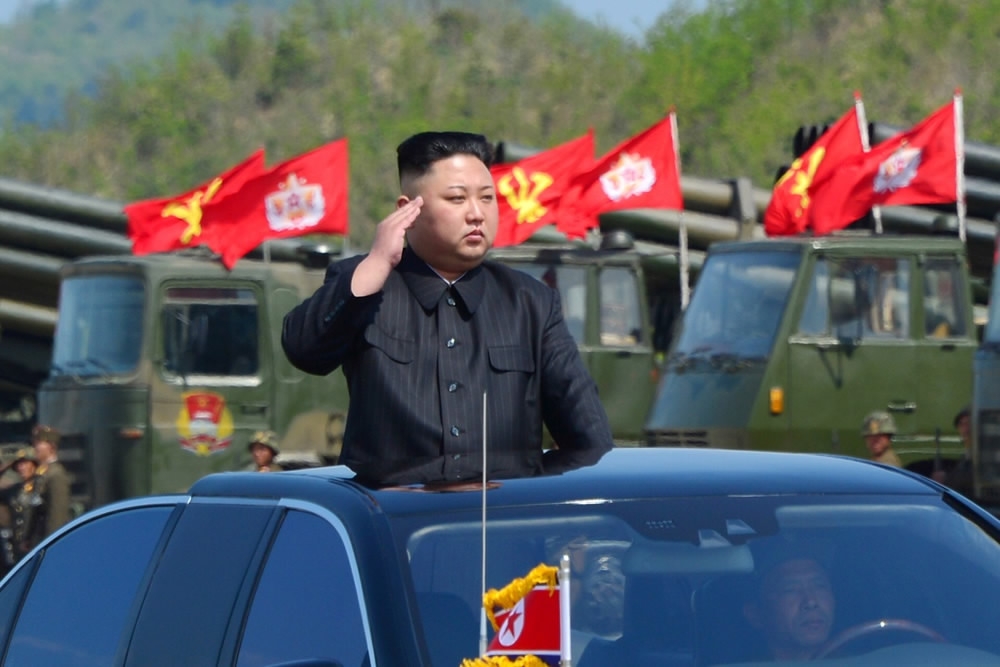
DPRK leader Kim Jong Un inspects artillery launchers ahead of a military drill marking the 85th anniversary of the establishment of the Korean People's Army in Pyongyang, April 25, 2017. /Reuters Photo
DPRK leader Kim Jong Un inspects artillery launchers ahead of a military drill marking the 85th anniversary of the establishment of the Korean People's Army in Pyongyang, April 25, 2017. /Reuters Photo
"They have been helping us," Trump
hailed China's help over the DPRK crisis in a television interview late last month. "They're closing off their banking systems to North Korea (the DPRK). They have cut the oil way down. Now, the banking systems we can see, because they all come through (the US) as you know."
Trade is another disputed topic between China and the US. China has become the largest trade partner of the US, while the latter is China's second largest. In 2016, China-US trade volume reached 524.3 billion US dollars. However, the Trump administration has been urging Beijing to address their trade imbalance. In response, Beijing says America's trade deficit is due to its more advanced position in the global production chain, adding that China actually prefers more balanced trade relations with other countries.
Beijing and Washington accelerated their economic dialogue after the Xi-Trump summit in Florida. The two countries announced the initial results of the 100-Day Action Plan of the China-US Comprehensive Economic Dialogue in May, allowing the US to export beef products to China this summer for the first time since 2003.

A rancher herds his cattle in Hitchcock, south of Houston, US, July 15, 2017. /Xinhua Photo
A rancher herds his cattle in Hitchcock, south of Houston, US, July 15, 2017. /Xinhua Photo
During Trump's China tour, a US business delegation led by Commerce Secretary Wilbur Ross is expected to sign a number of deals with Chinese companies.
Is Trump friendlier than his predecessors?
Commenting on the positive changes to China-US relations, Yin Chengde, a former counselor of the Chinese embassy to the US, said in terms of policies toward China, a once impulsive Trump has become constructive and pragmatic. In an opinion piece recently published on Jiefang Daily, Yin said Trump is now friendlier to China than his predecessors.
But other experts are not so optimistic about China-US relations, as gaps between them still exist.
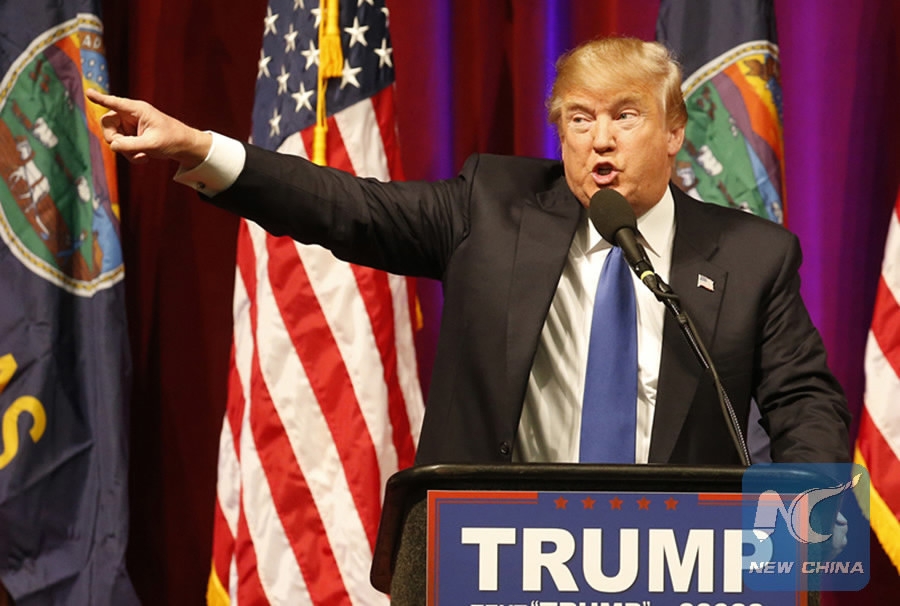
Donald Trump was known for his China-bashing comments during his presidential campaign in 2016. /Xinhua Photo
Donald Trump was known for his China-bashing comments during his presidential campaign in 2016. /Xinhua Photo
The Chinese people have learned through the country's interactions with the US over the past one to two decades that China-US relations would neither be too good nor too bad, Wang Wen, executive dean of Chongyang Institute for Financial Studies at Renmin University of China, wrote in a commentary on Guancha.cn on Sunday.
Wang said the two countries should develop their ties on the principles of non-conflict, non-confrontation, mutual respect and win-win cooperation in the new era, suggesting that Beijing should be proactive in shaping American policies to China.

